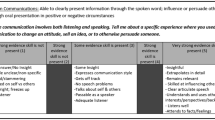Abstract
Objective: To determine whether patient satisfaction ratings can be predicted by faculty ratings or self-ratings of resident humanism.
Design: A prospective three-month collection of patient satisfaction ratings in two ambulatory care clinics and simultaneous acquisition of faculty ratings and self-ratings of resident humanism using ABIM questionnaires.
Setting: Two teaching hospital ambulatory care internal medicine clinics.
Participants: Forty-seven internal medicine residents and 17 faculty internists were sent questionnaires for evaluation of humanism of individual residents. One thousand one hundred ninety-four consecutive outpatients cared for by the residents were eligible for patient satisfaction questionnaires.
Measurements and main results: Thirty-three residents and 13 faculty completed evaluations of resident humanism while 792 patients completed satisfaction questionnaires, which were used for analysis. The faculty ratings of resident humanism correlated strongly with patient satisfaction ratings, while the resident self-ratings did not.
Conclusions: Faculty ratings of resident humanism were highly predictive of patient satisfaction with the care rendered by internal medicine residents in two ambulatory care clinics. This suggests that ambulatory care settings are useful for evaluation of noncognitive behavioral features of resident performance.
Similar content being viewed by others
References
Duffy LD, Hamerman D, Cohen MA. Communication skills of house officers. A study in a medical clinic. Ann Intern Med. 1980;93:354–7.
DeMonchy C. More attention should be paid to the formation of attitudes in doctors. Med Teach. 1990;12:339–44.
Simpson M, Buckman R, Stewart M, et al. Doctor-patient communication: the Toronto consensus statement. BMJ. 1991;303:1385–7.
Frances V, Korsch BM, Morris MJ. Gaps in doctor-patient communications. N Engl J Med. 1969;280:535–40.
Wartman SA, Morlock LL, Malitz FE, Palm EA. Patient understanding and satisfaction as predictors of compliance. Med Care. 1983;21:886–91.
Hulka BS, Kupper LL, Cassel JC, Mayo F. Doctor-patient communications and outcomes among diabetic patients. J Community Health. 1975;1:15–27.
Orth JE, Stiles WB, Scherwitz K, Hiennrikus D, Vallbona C. Patient exposition and provider explanation in routine interviews and hypertensive patients’ blood pressure control. Health Psychol. 1987;6(1):29–42.
Uhlmann RF, Inui TS, Peconaro RE, Carter WB. Relationship of patient request fulfillment to compliance, glycemic control and other health care outcomes in insulin-dependent diabetes. J Gen Intern Med. 1988;3:458–63.
Greenfield S, Kaplan SH, Ware JE Jr, Yano EM, Frank HJL. Patients’ participation in medical care: effects on blood sugar control and quality of life in diabetes. J Gen Intern Med. 1988;3:448–57.
Swanson AS. Medical education in the United States and Canada. J Med Educ. 1984;59:35–56.
Bickel J. Human values teaching programs in the clinical education of medical students. J Med Educ. 1987;62:360–78.
McElhinney TB (ed). Human Values Teaching Programs for the Health Professionals. Ardmore, PA: Whitmore Publishing, 1981.
Tarail M, Friedman S. A workshop to foster medical humanism in residents. Acad Med. 1989;65:280.
Guide to Awareness and Evaluation of Humanistic Qualities in the Internist, 2nd ed. Philadelphia: American Board of Internal Medicine, 1992;1–24.
Noel GL, Herbers JE Jr, Caplan MP, Cooper GS, Pangaro LN, Harvey J. How well do internal medicine faculty members evaluate the clinical skills of residents? Ann Intern Med. 1992;117:757–65.
Davis JK, Inamdar S, Stone RK. Interrater agreement and predictive validity of faculty ratings of pediatric residents. J Med Educ. 1986;61:901–5.
Durand RP, Levine JH, Lichtenstein LS, Fleming GA, Ross GR. Teachers’ perceptions concerning the relative values of personal and clinical characteristics and their influence on the assignment of students’ clinical grades. Med Educ. 1988;22:335–41.
Morton JB, MacBeth W. Correlations between staff, peer and self-assessments of fourth year surgery residents. Med Educ. 1977;11:167–78.
Di Tomasso RA, Willard M. The development of a patient satisfaction questionnaire in the ambulatory setting. Fam Med. 1991;23:127–31.
Mathews DA, Sledge WH, Liberman PB. Evaluation of intern performance by medical in-patients. Am J Med. 1987;83:938–44.
Webster G. Final report on the patient satisfaction questionnaire project. Philadelphia: American Board of Internal Medicine, 1989.
Klessig J, Robbins AS, Willard D, Rukenstein L. Evaluating humanistic attributes of internal medicine residents. J Gen Intern Med. 1989;4:514–21.
American Board of Internal Medicine. Evaluation of clinical competence. Philadelphia: American Board of Internal Medicine, 1986.
Ramsey PG, Wenrich MD, Carline JD, Inui TS, Larsen EB, LoGerfo JP. Use of peer ratings to evaluate physician performance. JAMA. 1993;269:1655–60.
Roberts JC, Tugwell P. Comparison of questionnaires determining patient satisfaction with medical care. Health Serv Res. 1987;24:637–54.
Woolliscroft JO, Calhoun JG, Billiu GA, Stross JK, MacDonald M, Templeton B. House officer interviewing techniques: impact on data dictation and patient perceptions. J Gen Intern Med. 1989;4:108–14.
Butterfield PS, Mazzaferri EL, Sacks LA. Nurses as evaluators of the humanistic behavior of internal medicine residents. J Med Educ. 1987;62:842–9.
Butterfield PS, Mazzaferri EL. A new rating form for use by nurses in assessing residents’ humanistic behavior. J Gen Intern Med. 1991;6:155–61.
Kaplan CB, Centor RM. The use of nurses to evaluate houseofficers’ humanistic behavior. J Gen Intern Med. 1990;5:410–4.
Moore B, Wergowski GL. Participation of nurses in the evaluation of residents’ interpersonal skills. Acad Med. 1991;66:494–5.
Blurton RR, Mazzaferri EL. Assessment of interpersonal skills and humanistic qualities in medical residents. J Med Educ. 1985;68:648–50.
Linn LS, Oye RK, Cope DK, Dimatteo MR. Use of non-physician staff to evaluate humanistic behavior of internal medicine residents and faculty members. J Med Educ. 1986;61:918–20.
Author information
Authors and Affiliations
Additional information
Received from McGill University, Departments of Medicine and Epidemiology and Biostatistics, Montreal General and Royal Victoria Hospitals, Montreal, Quebec, Canada.
Supported by the Fonds de la recherche en santé du Quebec and the Royal Victoria Hospital Department of Medicine research and education fund.
Rights and permissions
About this article
Cite this article
McLeod, P.J., Tamblyn, R., Benaroya, S. et al. Faculty ratings of resident humanism predict patient satisfaction ratings in ambulatory medical clinics. J Gen Intern Med 9, 321–326 (1994). https://doi.org/10.1007/BF02599179
Issue Date:
DOI: https://doi.org/10.1007/BF02599179




